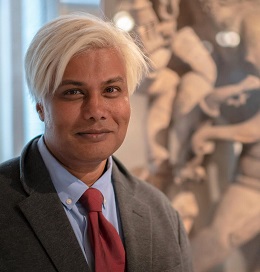
Vishwa P. Adluri is a professor in the Philosophy Department at Hunter College, New York, and the author of over a dozen articles and essays on the Mahābhārata. His work mainly focuses on the reception of ancient thought—both Greek and Indian—in modernity. He authored Parmenides, Plato and Mortal Philosophy: Return from Transcendence, The Nay Science: A History of German Indology and Philology and Criticism: A Guide to Mahābhārata Textual Criticism and has edited several volumes on the Mahābhārata, including Argument and Design: The Unity of the Mahābhārata. Vishwa Adluri has a PhD in Philosophy from the New School for Social Research, New York, a PhD in Indology from Philipps University, Marburg, and a PhD in Sanskrit from Deccan College, Pune.
Abstracts of the lectures
The Hindu Epics from a Philosophical Perspective
In this two-part presentation we shall overcome the dominant historicising approach to the Sanskrit epics, and instead learn to appreciate them as literary works of great philosophical brilliance, which bring about the salvific self-transformation of the individual by teaching him to view the universe as an aesthetic spectacle.
Part 1 will cover the Western reception of the Mahābhārata as a historical work. It will focus on Western scholars’ theories of an Indo-European epic tradition, attempts to recover an ur-epic, and identification of alleged layers of textual revision and addition. This part will conclude by contrasting the epic’s self-understanding as a dharma text with these critical views. Sukthankar’s creation of the Mahābhārata critical edition project lays the groundwork for the reappropriation and philosophical interpretation of the text.
Part 2 will look at the Mahābhārata’s opening books to understand how the epic itself conveys to us how it wishes to be read. We shall look at the occurrence of a hermeneutic and pedagogic apparatus in the Adiparvan, and also explore the doubling of reality and text within the “textual universe” of the Mahābhārata. Special attention will be paid to the status of Vyasa as author. Finally, we shall see how the epic’s circular narrative architecture replicates the cycles of the cosmos, and how the jiva can escape those cycles by viewing the universe as a narrative.